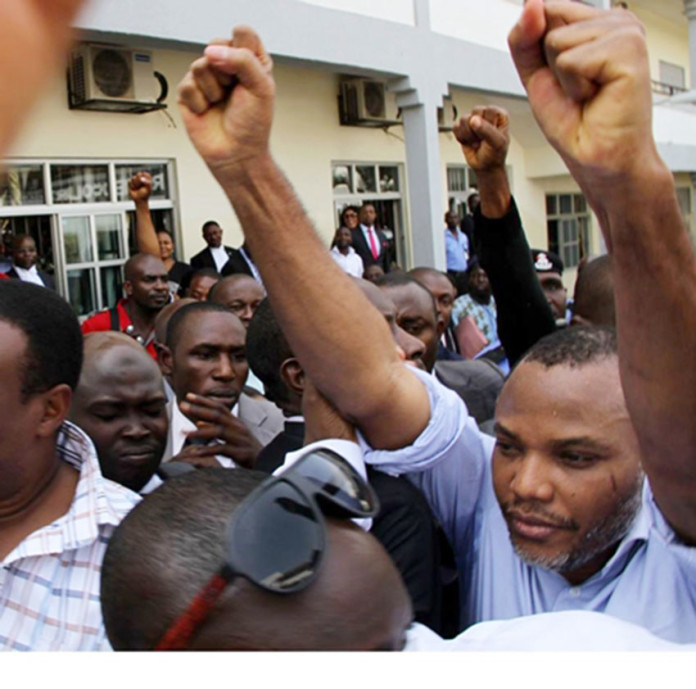By Aloy Ejimakor
The following are some of the untold stories as well as points to ponder in the matter of State versus Nnamdi Kanu. In this piece, I will deal only with the charge that Mazi Kanu defamed President Buhari. Here we go:
First – Kanu was arrested on October 14, 2015, and subsequently accused and charged for ‘publication of defamatory matter contrary to section 375 of the Criminal Code Act by referring to Muhammadu Buhari, President of the Federal Republic of Nigeria as “a pedophile, a terrorist, an idiot and an embodiment of evil” in a broadcast on Radio Biafra on April 28, 2015‘.
Buhari became President on May 29, 2015. Kanu was charged for defaming him “in a broadcast on Radio Biafra on April 28, 2015‘, – a month before Buhari became President.
The legal question that arises from above two dates is this: Given that Kanu is being charged for defaming ‘Buhari as President of Nigeria‘, can criminal liability arise from a broadcast he allegedly made a clear one month before Buhari became President? Or, is the Attorney-General advisedly prosecuting the defamation as impacting Buhari when he was still private citizen? If this is the case, is it proper or even legal? If perchance it’s legal, is it then an overkill to the point that now stokes the notion of persecution instead of prosecution?
Second – The prosecution alleged that the defamatory broadcast was aired in a broadcast made on Radio Biafra. Now ponder the following observations and consider whether they will be of impact on Kanu’s criminal liability:
Radio Biafra is not a station situated or broadcasting in Nigeria.
Kanu uttered the defamatory words in London (not in Nigeria).
Does the foregoing raise jurisdictional challenges to sustaining the charge? If it doesn’t, then how do we deal with – for instance – a BBC news anchor or broadcaster who uttered the same set of words Kanu is accused of uttering against Buhari? Will Nigeria attempt to extradite such British-citizen BBC broadcaster to Abuja to stand trial? And especially, if the Briton allegedly defamed Buhari before he became President?
While pondering these questions, please bear in mind that Kanu is also a British citizen. Even as this does not amount to an affirmative defense, is it enough to raise diplomatic issues for his trial?
And then this: In 2010, Britain repealed the offense of ‘defamatory libel’, which is akin or analogous to Nigeria’s ‘criminal libel’, or ‘defamation’. Now, the question you may ask is: If what Kanu allegedly broadcast is unarguably not a crime in Britain – the locale of the broadcast – can it be used as a basis to ground criminal liability in Nigeria?
Or how would a Nigerian court view as crime what is no longer crime in Britain, and on whose soil the alleged crime was committed?
And recall that we received our laws from Britain, including particularly the law on criminal libel. While rueing this, keep in mind that aspects of British law are still applicable in Nigeria to this day; and Nigerian judges still look to British jurisprudence – at least as persuasive authority – when resolving difficult legal questions.
Third – In 2009, the FCT High held that a criminal trial for defamation shall not be allowed to continue because President Yar’Adua (like President Buhari) is constitutionally protected from being a witness to a suit whilst still in office. The court gave the ruling in a criminal defamation charge preferred against Sam Nda-Isaiah of Leadership newspaper.
The ruling was grounded on the Constitution’s Sections 36 (fair hearing, which includes the right of the accused to examine/confront his accuser in court); and Section 308 (the immunity of the President from being summoned to court to testify).
Citing the ratio in Tinubu V. IMB Securities and Mediatech V. Lam Adesina, the court reasoned that ‘since the President is not compellable as a witness and cannot waive the immunity conferred on him under Section 308 of the Constitution, the defendants will be denied their fundamental right to fair hearing as mandated by Section 36 of the Constitution’.
To be clear, the rationale is simple and sound, and that is: Defamation is an injury on reputation, so the President (in this case – Buhari) whose reputation is said to be defamed must, under the constitutional principles of fair hearing, be called as a witness to be led (by the AGF) and cross-examined (by Nnamdi Kanu) in a trial where Buhari’s reputation or character will be tested to the hilt.
Since Section 308 (immunity) of the Constitution says that can’t happen, an intractable conflict arises with Section 36 (fair hearing) of the same Constitution. Given this scenario, is it not obvious that the charge of defamation is already doomed?
Ejimakor, a lawyer, writes from alloylaw@yahoo.com













